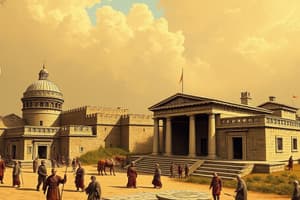Podcast
Questions and Answers
What is the primary focus of political history?
What is the primary focus of political history?
- Cultural developments and artistic movements
- Political events, systems, and figures (correct)
- Social structures and daily life
- Economic systems and trade patterns
Which period is characterized by the rise of feudalism and the Crusades?
Which period is characterized by the rise of feudalism and the Crusades?
- Ancient History
- Early Modern History
- Modern History
- Medieval History (correct)
What does historiography study?
What does historiography study?
- Social interactions and daily life of past societies
- Military strategies used in historical conflicts
- Cultural influences on economic practices
- The writing of history and evolving historian perspectives (correct)
Which method involves placing historical events within their appropriate social, economic, and political contexts?
Which method involves placing historical events within their appropriate social, economic, and political contexts?
What key characteristic does 'Modern History' include?
What key characteristic does 'Modern History' include?
Which aspect of history examines the production, distribution, and consumption of goods?
Which aspect of history examines the production, distribution, and consumption of goods?
What challenge do historians face when studying past events?
What challenge do historians face when studying past events?
Which historical period followed Ancient History and is marked by the Renaissance?
Which historical period followed Ancient History and is marked by the Renaissance?
Which approach to understanding history entails examining primary and secondary sources?
Which approach to understanding history entails examining primary and secondary sources?
What does social history primarily investigate?
What does social history primarily investigate?
Flashcards
What is history?
What is history?
The study of past events, especially those involving humans, their societies, and their interactions. It involves analyzing primary and secondary sources to understand and interpret historical events.
Prehistory
Prehistory
The period in human history before the invention of writing. It is characterized by the development of early human societies, hunter-gatherer cultures, and the emergence of agriculture.
Ancient History
Ancient History
The period covering ancient civilizations like Mesopotamia, Egypt, Greece, and Rome. Key aspects include the development of writing systems, political structures, and cultural achievements.
Medieval History
Medieval History
Signup and view all the flashcards
Early Modern History
Early Modern History
Signup and view all the flashcards
Modern History
Modern History
Signup and view all the flashcards
Political History
Political History
Signup and view all the flashcards
Social History
Social History
Signup and view all the flashcards
Economic History
Economic History
Signup and view all the flashcards
Cultural History
Cultural History
Signup and view all the flashcards
Study Notes
Overview of History
- History is the study of past events, particularly in human affairs.
- It involves examining primary and secondary sources to reconstruct and analyze past events.
- Historians use various methods, including source analysis, contextualization, and interpretation, to understand the past.
- The study of history helps us understand current events, social structures, and human behavior.
Historical Periods
- Prehistory: The period before the invention of writing. Key aspects include the development of early human societies, hunter-gatherer cultures, and the emergence of agriculture.
- Ancient History: Covers civilizations like Mesopotamia, Egypt, Greece, and Rome, characterized by advancements in writing, political systems, and culture.
- Medieval History: This period, often spanning Europe, is marked by feudalism, the rise of Christianity, and the Crusades.
- Early Modern History: This period witnessed significant changes across Europe, including the rise of nation-states, the Renaissance, and the Age of Exploration.
- Modern History: This period covers major events like the French Revolution, the Industrial Revolution, and World Wars.
Key Themes in History
- Political history: Focuses on political events, systems, and figures.
- Social history: Explores social structures, customs, and daily life.
- Economic history: Examines the production, distribution, and consumption of goods and services throughout time.
- Cultural history: Studies the development of art, ideas, beliefs, and other aspects of culture.
- Military history: Focuses on armed conflict, warfare, and military strategy.
Approaches to Understanding History
- Source analysis: Examining primary and secondary sources to understand events, figures, and contexts.
- Contextualization: Placing historical events in the appropriate social, economic, and political environment.
- Interpretation: Constructing meaning from historical evidence, recognizing that multiple perspectives are possible.
- Historiography: The study of the writing of history itself, examining how historians' perspectives and methods have changed over time.
- Historical methodology: The techniques and principles used by historians to gather, analyze, and interpret evidence.
Challenges in Studying History
- Bias: Recognizing and accounting for biases in historical sources and interpretations.
- Limited evidence: Historians often work with incomplete or fragmented data.
- Different perspectives: Understanding that multiple perspectives can exist regarding a particular event.
- Preservation of sources: Ensuring the preservation of historical documents and artifacts ensures future understanding.
Studying That Suits You
Use AI to generate personalized quizzes and flashcards to suit your learning preferences.




